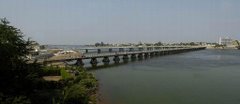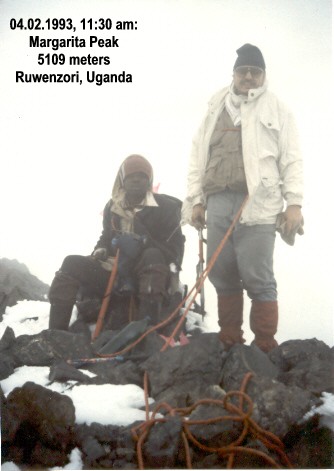Paul Theroux (Jg. 1941) ist ein amerikanischer Reiseschriftsteller und Autor, berühmt geworden durch sein Werk The Great Railway Bazaar (1975), eine literarische Verarbeitung seiner Tour von England, über West- nach Osteuropa, den Nahen Osten, durch Südasien, dann Südostasien, Ostasien, bis nach Japan, und wieder zurück durch Russland bis zum Ausgangspunkt England. (Mehr über Theroux bei Wikpedia. Auszug: As a traveler he is noted for his rich descriptions of people and places, laced with a heavy streak of irony often mistaken for misanthropy [Menschenhass].) Als junger Mann hat er von 1961 bis 1966 als Dozent an der Makerere Universität in Uganda unterrichtet und hatte dort u.a. den jungen Apolo Nsibambi als Kollegen. Nsibambi ist seit 1999 Premierminister unter Museveni in Uganda. Ich selbst kannte Nsibambi auch sehr gut, wir waren während meiner Zeit in Uganda (1987 – 1993) gemeinsam Rotarier des Rotarierclubs Kampala West. In 2001 hat Theroux noch einmal eine große Tour unternommen von Kairo bis Kapstadt, die er in dem Werk Dark Star Safari verarbeitet hat. Klar, dass ich mich dafür interessiert habe, enthält es doch auch Eindrücke über seine Rückkehr nach Uganda – nach über 30 Jahren. Und mit Apolo Nsibambi hatten wir ja auch einen gemeinsamen Bekannten.
(Hervorhebungen durch mich.)
"Inside the gates of Makerere University was a mosque, painted green. The sloping landscaped front lawn of a university was the last place you expected to see a mosque and minaret. But there it was - a gift of Muammar Ghaddafi, I was told. Africans refused nothing. A road, a dorm, a school, a bank, a bridge, a cultural center, a dispensary - all were accepted. But acceptance did not mean the things were needed, nor that they would be used or kept in repair. Even this mosque, which was clearly an eyesore, was falling into ruin. (...)
I asked John Ntambirweke [auch ein Dozenten-Kollege Theroux' von damals] about the recent election.
‘An election is not the only indicator of democracy,' he said, at the wheel of his car, negotiating the obstacles in this battered ivory tower. 'Democracy means much more - after all, the Romans had elections. Was Rome a democracy? We need a wider definition. We need more institutions, not one thing but many; so that people can be free.'
'They are free, aren't they? But they're hungry.'
'The people here need to be granted some political space,' he said. That seemed an appropriate term for Africans who were always lumped together.
'What I really object to is an intelligent man like Nsibambi, the prime minister, explaining in so many words that we require a one-party system. That we Africans are not clever enough or mature enough to think for ourselves. That we are somehow less than other people - inferior to people who have a real opposition.'
'There were several opposition parties fighting the election,' I said. 'They lost, right?'
'The election doesn't prove anything.'
'Some African countries don't even have them,' I said.
'We need them, but we need more than that,' he said. 'I am really disappointed with the level of political debate in this country.'
'Haven't people in Uganda been saying that since 1962? I used to hear it all the time.'
'It's worse now,' he said. 'We are treated as though we are unworthy, not capable of making choices and distinctions. It's insulting!'
'What do people in Uganda say when you mention these things? Or maybe you don't mention these things?'
'I do - all the time. I write them. I say them on the radio. I was saying them last Thursday on the radio just after the election. These days we are free to say anything.' 'But it doesn't do any good,' he said. 'They will just say, "Oh, there he goes again - that's John, complaining as usual.’”
'That's better than being locked up, which was the traditional response here.'
'No one is going to lock me up for saying these things,' he said, but with an air of resignation at how ineffectual his opinions were.
‘Kenya is another story,' he said. 'They had white settlers who were tough and who were determined to dominate. But here we just had a few - those tea planters around Fort Portal. They were nobodies. I've been looking at the records. If a white district commissioner offended one of our kings in some way he could be immediately transferred. The white officials had to learn how to get along with Ugandan chiefs and kings. This policy lasted until independence. We were not colonized in Uganda. This was a protectorate. Our kings continued into independence.'
'That's fine,' I said, 'but if the chiefs and kings had that much power, then maybe that's a Ugandan problem - authority figures become very bossy.'
'Maybe. But it wasn't the case in Kenya. And there's the racial thing,' he said. 'I travel a lot with other Africans. And I notice that Kenyans, Zimbabweans, and Zambians have a strange way of dealing with white people. They behave oddly when they're around them.'
He laughed and said, 'Yes. When we're traveling in Britain or America, these other Africans detect slights - or they imagine reactions that I don't see. They are very uneasy around white people, but this is not the case among Ugandans.'
I told him I was glad to hear him say that, because it was how I had felt about Uganda; it was one of the reasons I had liked living there. People looked me straight in the eye. But racism crept into the political rhetoric and at last I was just a mzungu from Wazungu-Iand, someone to blame, and at last I had found Africa an easy place to leave. (...)
Leaving Makerere later that day in a taxi, I asked the driver who he had voted for in the recent election. He laughed and said, 'These elections are held mainly to impress donor countries - to prove that we are doing the right thing. But it was a rigged election, and we voters are not impressed.'
(Seiten 215ff in der Pinguin-Ausgabe von 2002)



